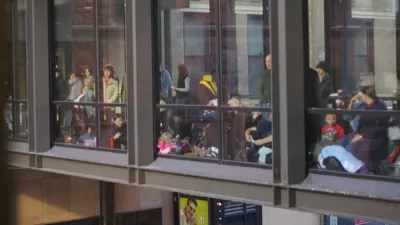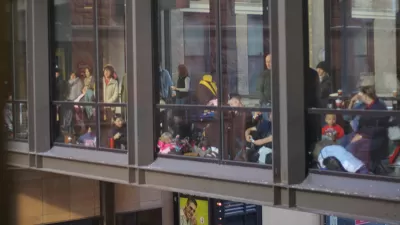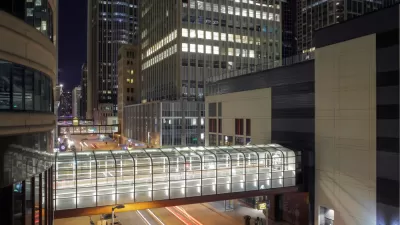The debate over public safety in Downtown St. Paul is once again focused on the city's skyways. There, concerns about access challenge any possible solutions.

A fight over Downtown St. Paul's skyways is also a fight for the "future of downtown itself, according to an article by Peter Callaghan.
The owner of the Railroader Printing Building began locking the public out of the skyway it shares with several other buildings on E. 6th Street hours in March. The owner, Jaunae Brooks, is also petitioning the city council for permission to make the change permanent, reports Callaghan.
Her reasons? As Brooks explained in a lengthy letter to the city, she thinks people who misuse the system are putting her tenants and the public at risk. “The homeless have been literally living in my skyway for the past few years, suitcases and all,” she wrote. “They sleep naked and clothed, cook on hot plates, eat, poop and pee, smoke cigarettes and pot creating a fire hazard, drink alcohol, have sex leaving used condoms behind, use drugs intravenously and leave needles behind, litter and vandalize my property daily.”
There has been no shortage of opposition to the petition, including from the Skyway Governance Advisory Committee, disability advocates, local residents and workers, and city officials. The concern is the precedent closing the skyway early would set for the legal agreement between private building owners and the city about the use of St. Paul's skyways.
The controversy over this particular skyway is set against a context of a downtown revitalization that means the skyways around downtown are busier and more active than ever. Some even blame the rising incidences of public safety concerns in the skyways (which Planetizen last documented in May 2016) on some of the amenities that have opened up in recent years around Downtown St. Paul, like the Central Station of the Green Line.
FULL STORY: Why a dispute over skyway hours is really a fight over the future of downtown St. Paul

Alabama: Trump Terminates Settlements for Black Communities Harmed By Raw Sewage
Trump deemed the landmark civil rights agreement “illegal DEI and environmental justice policy.”

Planetizen Federal Action Tracker
A weekly monitor of how Trump’s orders and actions are impacting planners and planning in America.

The 120 Year Old Tiny Home Villages That Sheltered San Francisco’s Earthquake Refugees
More than a century ago, San Francisco mobilized to house thousands of residents displaced by the 1906 earthquake. Could their strategy offer a model for the present?

Ken Jennings Launches Transit Web Series
The Jeopardy champ wants you to ride public transit.

BLM To Rescind Public Lands Rule
The change will downgrade conservation, once again putting federal land at risk for mining and other extractive uses.

Indy Neighborhood Group Builds Temporary Multi-Use Path
Community members, aided in part by funding from the city, repurposed a vehicle lane to create a protected bike and pedestrian path for the summer season.
Urban Design for Planners 1: Software Tools
This six-course series explores essential urban design concepts using open source software and equips planners with the tools they need to participate fully in the urban design process.
Planning for Universal Design
Learn the tools for implementing Universal Design in planning regulations.
Clanton & Associates, Inc.
Jessamine County Fiscal Court
Institute for Housing and Urban Development Studies (IHS)
City of Grandview
Harvard GSD Executive Education
Toledo-Lucas County Plan Commissions
Salt Lake City
NYU Wagner Graduate School of Public Service




























